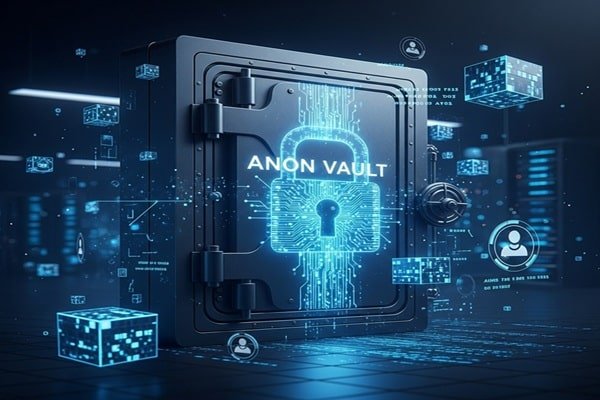
In today’s digital world, privacy feels like a luxury. From social media trackers to corporate data harvesting, it seems like someone is always watching. Enter Anon Vault, a solution designed for anyone who wants absolute control over their digital footprint. Whether you’re a journalist, activist, or everyday user tired of surveillance, Anon Vault offers a secure, anonymous way to store your data.
Let’s dive into what Anon Vault is, how it works, its real-world uses, and why it’s becoming a game-changer in personal digital security.
What is Anon Vault?
At its core, an Anon Vault is a highly encrypted storage system that prioritizes anonymity, user control, and security. Unlike regular cloud storage, it doesn’t ask for your name, email, or personal info. Access is usually granted via cryptographic keys, sometimes routed through Tor networks, or backed by blockchain protocols to ensure privacy.
Think of it as a digital safe: only you hold the key, and even the service provider can’t peek inside.
Why Anon Vaults Are Different from Traditional Cloud Storage
Here’s a quick comparison:
| Feature | Traditional Cloud Storage | Anon Vault |
|---|---|---|
| User Identification | Required | Not required |
| Encryption | Often server-side | End-to-end, zero-knowledge |
| Metadata Exposure | High | Minimal to none |
| Decentralization | Rare | Often decentralized |
| Payment Models | Subscription, credit card | Crypto, anonymous tokens |
| Surveillance Risk | Present | Minimized |
Unlike platforms like Google Drive or Dropbox, Anon Vaults don’t track your activity or store metadata that could link files back to you.
Why People Are Turning to Anon Vaults
People choose Anon Vaults for both practical and philosophical reasons:
-
Avoiding Surveillance: Governments and corporations are constantly tracking online behavior. Anon Vault keeps your data off the radar.
-
Whistleblower Protection: Activists and journalists can store sensitive documents without risking exposure.
-
Cryptographic Empowerment: Users control their encryption keys, making breaches far less damaging.
-
Bypassing Censorship: Resilient systems prevent data from being easily taken down in restrictive regimes.
Essentially, it’s about taking back control of your data in a world where convenience often comes at the cost of privacy.
How Anon Vaults Work: Behind the Scenes
Anon Vaults combine multiple technologies to create a secure, anonymous storage ecosystem:
-
Zero-Knowledge Encryption: Files are encrypted on your device before leaving it. Even the provider cannot decrypt your data.
-
Onion Routing: Similar to Tor, this anonymizes your network activity, making tracing nearly impossible.
-
IPFS (InterPlanetary File System): Data is sharded and distributed across nodes worldwide, not stored in one centralized server.
-
Blockchain Integration: Some Anon Vaults store file hashes on-chain to ensure tamper-evidence without compromising privacy.
Together, these systems ensure your data is both secure and invisible.
Challenges and Trade-Offs
While Anon Vaults are powerful, they aren’t perfect:
-
Usability: Many systems require a technical understanding of encryption.
-
Speed: Decentralized networks can be slower than traditional cloud servers.
-
Account Recovery: Lose your key, and your data is likely gone forever.
-
Legal Gray Areas: In some countries, strong encryption can attract scrutiny or regulatory hurdles.
These factors mean Anon Vaults are better suited for users with high privacy needs rather than casual storage.
Who is Building Anon Vaults?
The Anon Vault ecosystem is diverse:
-
Open-Source Communities: Peer-reviewed, auditable projects for transparency.
-
Non-Profits: Supporting secure communications for journalists and human rights activists.
-
Startups: Offering privacy-first storage with crypto or anonymous payment options.
-
Anonymous Developers: Pseudonymous creators often publish tools on GitHub or private forums.
This variety strengthens the ecosystem, making it resistant to attacks or censorship.
Real-World Applications and Use Cases
Anon Vaults aren’t just theoretical—they’re already in action:
-
Journalism: Reporters can safely store sensitive material for investigative stories.
-
Healthcare: Securely share patient records without relying on centralized databases.
-
Cryptocurrency: Protect private keys and transaction logs outside exchanges.
-
Human Rights Activism: Document and transmit evidence safely to international bodies.
Basically, if your work requires sensitive data handling, Anon Vault can be a lifesaver.
The Ethics of Anonymity
Anon Vaults raise ethical questions. While they protect users’ rights, they could be misused. Developers in the space emphasize:
-
Transparency in code
-
Community governance
-
Rigorous threat modeling
The goal is to empower people without enabling harm, a delicate but necessary balance.
Future Trends in Anon Vault Development
Looking ahead, several trends are shaping the next generation of Anon Vaults:
-
AI-Powered Privacy Filters: Automatically redact sensitive metadata.
-
Post-Quantum Encryption: Prepare for future cryptographic threats.
-
Smart Contracts: Dynamically control access without central authority.
-
Mobile-First Designs: Bring anonymity to everyday devices.
-
Data Sharding & Proof-of-Storage: Ensure decentralization without slowing access.
The future points to stronger, faster, and more accessible privacy solutions.
Also Read : CrypticStreet.com: A Deep Dive Into the Web’s Most Talked-About Mystery Marketplace
Security Best Practices for Anon Vault Users
Maximize your protection with these tips:
-
Key Management: Store encryption keys offline or on hardware wallets.
-
Multi-Layer Authentication: Even anonymous systems benefit from extra verification.
-
Regular Audits: Check for metadata leaks or unauthorized access.
-
Stay Updated: Always use the latest software versions to patch vulnerabilities.
Your privacy is only as strong as your practices and habits.
A Paradigm Shift: From Convenience to Consciousness
Anon Vaults represent more than just secure storage—they’re part of a broader cultural shift. Users are increasingly questioning what they trade for convenience:
-
Sovereignty over speed
-
Resilience over replication
-
Principle over profit
As data breaches and surveillance scandals rise, more people are consciously choosing privacy-first tools.
Conclusion: Anon Vaults as a Movement, Not Just a Tool
Anon Vaults are more than encrypted storage—they’re a step toward digital autonomy. They empower users to control their data, protect their identity, and navigate the internet without leaving traces.
While not perfect for casual use, for privacy-conscious individuals, the trade-offs are worth it. As technology matures, Anon Vaults could redefine trust, identity, and freedom in the digital era.
FAQs
1. What is an Anon Vault?
A privacy-focused, encrypted digital storage system that lets users store files anonymously using end-to-end encryption and cryptographic keys.
2. How is Anon Vault different from cloud storage?
It avoids personal information, uses zero-knowledge encryption, and often leverages decentralized systems like IPFS or blockchain.
3. Who should use an Anon Vault?
Journalists, activists, whistleblowers, cybersecurity professionals, or anyone worried about surveillance or data breaches.
4. Is it legal to use?
Mostly yes, but some countries have strict anti-encryption laws. Always check local regulations.
5. What happens if I lose my key?
Without your private encryption key, your data is likely lost permanently. Secure key management is essential.

